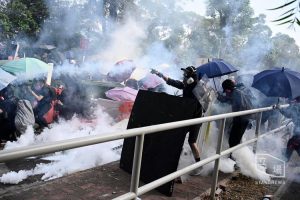The Alexander Hamilton Society hosted a panel in the ICC auditorium to discuss Chinese soft power on Sept. 18.
Allie Williams (SFS ‘19), president of the Alexander Hamilton Society, spoke on the importance of this discussion in light of a Foreign Policy report revealing the Chinese government actively funds a Georgetown student organization.
According to Foreign Policy, the Georgetown Chinese Students and Scholars Association, a social group primarily composed of Chinese graduate students, received $800 per semester from China. The report also indicated that U.S. intelligence officials have observed such student groups conducting surveillance against fellow Chinese students studying abroad. The group did not break any university regulations by receiving these funds.
Williams said the society aimed to host a discussion of this issue without the polarizing rhetoric surrounding something that is often seen as black and white. “It was really important to us to provide a forum for discussion on Chinese soft power, specifically on education in the US, because we thought that it was an issue very relevant to campus, and something we thought had been too politicized,” Williams said.
Dan Blumenthal, who studies Sino-American relations at the American Enterprise Institute, argued that this particular case fits into a larger trend of China engaging in propaganda-based “political warfare” against the United States.
“It’s even more unfortunate when a country uses overseas citizens as assets,” Blumenthal said. “It’s unfortunate, but it’s something we have to confront delicately and in conjunction with our ideals.”
Toshi Yoshihara, a fellow at the Center for Strategic and Budgetary Assessments, described the tactic as a way to surveil Chinese international students, who might bring Western ideologies back to China. “I think this is going to become a key point of contention in the coming years,” Yoshihara said.
Blumenthal went on to describe a network of information campaigns and global investment strategies designed to strengthen China’s cultural and economic power abroad. One example is China’s “One Belt, One Road” initiative, a series of highly-publicized infrastructure investments throughout Asia, Africa, and Europe.
He believes the investment is often overblown in the international press. “This is what the United States has to be careful about. You can turn perception into reality,” Blumenthal said.
Yoshihara explained that China’s multifaceted strategy, which includes propaganda, surveillance, and investment, is designed to transform how the world perceives the Chinese government. “I think there’s a more fundamental goal here,” Yoshihara said. “To borrow from Princeton scholar Aaron Friedberg, the goal is to make the world safe for authoritarianism, to make sure that the external environment perceives the world in a way that’s amenable to the party.”
Robert Sutter, a professor at George Washington University, spoke on the growing tensions between the American and Chinese governments. He cited a growing list of tariffs and a letter from lawmakers warning the Trump administration of “growing Chinese influence operations around the world.”
“The United States is in the middle of the most important reevaluation of its China policy in my 50 years here in Washington,” Sutter said. “I haven’t seen anything like this, what we’re doing now.”







